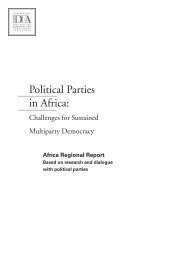Seminar Report The role of Political Parties in Democratic Transitions
Seminar Report The role of Political Parties in Democratic Transitions
Seminar Report The role of Political Parties in Democratic Transitions
You also want an ePaper? Increase the reach of your titles
YUMPU automatically turns print PDFs into web optimized ePapers that Google loves.
Conduct<strong>in</strong>g capacity build<strong>in</strong>g <strong>of</strong> political parties on party organisation, party fund<strong>in</strong>g and political party<br />
campaign<strong>in</strong>g <strong>in</strong> a cross-party sett<strong>in</strong>g and on an equal basis.<br />
Carry<strong>in</strong>g out civic education/democracy education for political leaders and their cadre and the general<br />
population<br />
Promot<strong>in</strong>g rule <strong>of</strong> law - especially <strong>in</strong> rural areas people are not able to exercise their rights.<br />
Establish<strong>in</strong>g a <strong>in</strong>formal multiparty dialogue platform outside <strong>of</strong> parliament is critical especially to<br />
change the constitution <strong>in</strong> an <strong>in</strong>clusive way.<br />
Promot<strong>in</strong>g the <strong>role</strong> <strong>of</strong> women <strong>in</strong> Parliament through affirmative action.<br />
Engag<strong>in</strong>g the private sector and local artists <strong>in</strong> the political discourse.<br />
Seek to counteract bra<strong>in</strong> dra<strong>in</strong> from Myanmar and promote “bra<strong>in</strong> ga<strong>in</strong>”.<br />
2.3. Workshop 3: Respond<strong>in</strong>g to voter expectations: Representation and Delivery - Challenges<br />
and ways forward <strong>in</strong> Myanmar<br />
By Mr C.K. Lal and a local co-facilitator Ms Kh<strong>in</strong> Su Myat Tun, Myanmar Egress<br />
In this workshop, the challenges, dilemmas and opportunities for respond<strong>in</strong>g to voter expectations were<br />
discussed. <strong>The</strong> shift to representative politics presents a steep learn<strong>in</strong>g curve for political parties. <strong>The</strong><br />
leaders <strong>of</strong> the transition must be capable <strong>of</strong> <strong>in</strong>spir<strong>in</strong>g and excit<strong>in</strong>g people, but at the same time, they must<br />
conv<strong>in</strong>ce the populace that sometimes they will have to wait, and adjust their demands to the reality <strong>of</strong> the<br />
political situation. <strong>Political</strong> parties need to be responsive to public op<strong>in</strong>ion, but ultimately, they also have a<br />
responsibility for lead<strong>in</strong>g and shap<strong>in</strong>g public op<strong>in</strong>ion accord<strong>in</strong>g to what is realistic.<br />
<strong>The</strong> shift to representative politics presents a steep learn<strong>in</strong>g curve for political parties. <strong>The</strong> leaders <strong>of</strong> the<br />
transition must be capable <strong>of</strong> <strong>in</strong>spir<strong>in</strong>g and excit<strong>in</strong>g people, but at the same time, they must conv<strong>in</strong>ce the<br />
populace that sometimes they will have to wait, and adjust their demands to the reality <strong>of</strong> the political<br />
situation. <strong>Political</strong> parties need to be responsive to public op<strong>in</strong>ion, but ultimately, they also have a<br />
responsibility for lead<strong>in</strong>g and shap<strong>in</strong>g public op<strong>in</strong>ion accord<strong>in</strong>g to what is realistic.<br />
This workshop facilitates a dialogue around:<br />
What are the key expectations <strong>of</strong> the citizens <strong>in</strong> Myanmar <strong>in</strong> the democratisation processes with<br />
regard the conduct and policies <strong>of</strong> the political parties?<br />
How can political parties accommodate the different views <strong>of</strong> various social groups and ethnic groups<br />
and help promote reconciliation, understand<strong>in</strong>g and peace?<br />
How can political parties facilitate democratic knowledge and practice among citizens; and<br />
improvements <strong>in</strong> citizens’ general livelihoods and wellbe<strong>in</strong>g?<br />
How do parties collect the needs and <strong>in</strong>terests <strong>of</strong> their electorate? What are the challenges <strong>in</strong><br />
engag<strong>in</strong>g with/<strong>in</strong>volv<strong>in</strong>g citizens? How can it be improved?<br />
Mr C.K. Lal asked what features do voters expect from a political party and from a political leader?<br />
Ultimately, however, the long-term success <strong>of</strong> political parties depends on what they do <strong>in</strong> between<br />
election campaigns rather than dur<strong>in</strong>g them.<br />
As an icebreaker, Mr C.K. Lal asked the workshop participants to decide their preferred way <strong>of</strong> decision<br />
mak<strong>in</strong>g <strong>in</strong> this workshop: by vot<strong>in</strong>g, consensus or by decision <strong>of</strong> their leader. <strong>The</strong> participants were also<br />
<strong>in</strong>vited to identify their favourite Myanmar political party other than their own party - and choose a<br />
preferred party leader <strong>of</strong> their choice (<strong>in</strong>ternational or local).<br />
Discussion<br />
In a participatory sett<strong>in</strong>g, <strong>in</strong> which workshop participants were divided <strong>in</strong>to four work<strong>in</strong>g groups, the<br />
follow<strong>in</strong>g set <strong>of</strong> questions were addressed:<br />
1. What are the key expectations <strong>of</strong> citizen <strong>in</strong> Myanmar <strong>in</strong> terms <strong>of</strong> policies and conduct <strong>of</strong> political<br />
affairs?<br />
2. How can political parties accommodate the differences between various local groups?<br />
3. How can political parties dissem<strong>in</strong>ate political knowledge and practise amongst the citizens?<br />
4. How do political parties collect the needs and <strong>in</strong>terest <strong>of</strong> the electorate and how can these methods be<br />
improved <strong>in</strong> Myanmar?<br />
14
















